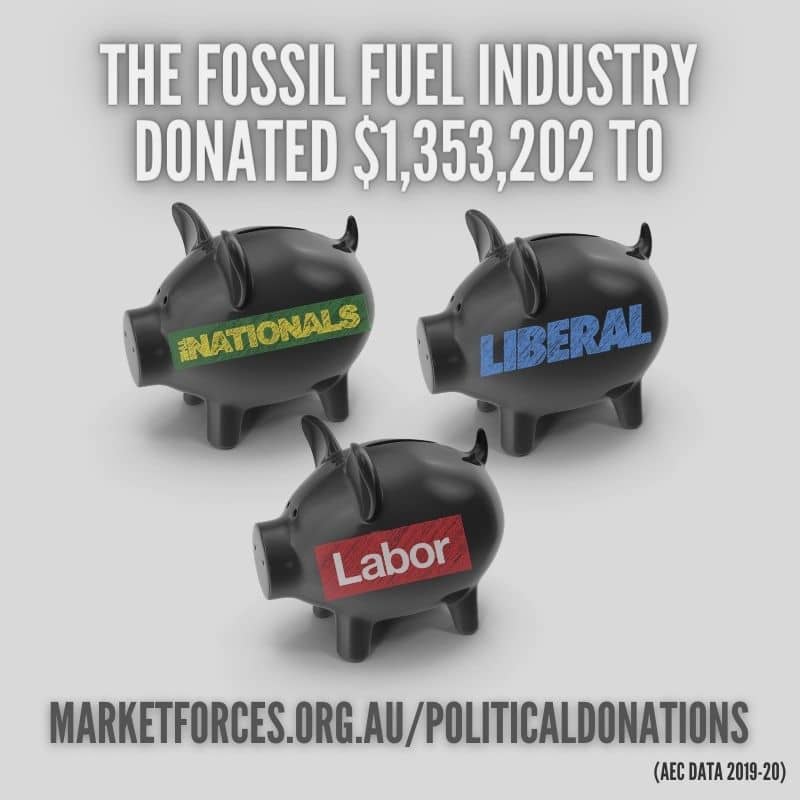1 February 2021
Prime Minister Scott Morrison was denied a speaking slot at the UN’s 2020 Climate Ambition Summit, and for good reason: Australia’s climate policy is one of the worst, and the rest of the world knows it.
Far from being a wake-up call, just weeks ago the Federal Government doubled down on its climate-wrecking gas agenda, announcing $173 million to develop the Northern Territory’s Beetaloo gas Basin.
Meanwhile, data analysed by Market Forces on Friday showed the Government gave $12 billion in tax breaks to the fossil fuel industry last financial year, while state governments also directly contribute to subsidising dirty fuels.
So why is Australia so far behind when it comes to climate action? A trawl of the latest political donations data, released on 1 February, offers some clues.
Hefty donations from the fossil fuel industry
Data released today shows that in FY2020, fossil fuel companies donated $1,353,202 to the ALP, Liberal and National parties.
Yet given Australia’s reputation for woefully inadequate political disclosure and ‘dark money’ donations, with 35% of all contributions coming from unknown sources, the true figure could be significantly higher.
Leading the pack in FY2020 with $335,415 worth of largesse was Woodside Energy, followed by the Minerals Council of Australia with $145,709 and Santos with $130,500.
Market Forces collates this data from the Australian Electoral Commission. Below you will find the top 10 fossil fuel donors from the last financial year (note: the table is interactive and contains all fossil fuel donors from FY2015 to FY2020).
| wdt_ID | Donor | Financial Year | ALP | LIB | NAT | ALP+LIB+NAT |
|---|---|---|---|---|---|---|
| 1 | Woodside Energy | 2019-20 | 137,665 | 130,250 | 67,500 | 335,415 |
| 2 | Minerals Council of Australia | 2019-20 | 56,235 | 66,374 | 23,100 | 145,709 |
| 3 | Santos | 2019-20 | 44,000 | 64,500 | 22,000 | 130,500 |
| 4 | Coal21 | 2019-20 | 28,050 | 39,504 | 25,300 | 92,854 |
| 5 | Chevron | 2019-20 | 32,000 | 45,000 | 15,100 | 92,100 |
| 6 | APPEA | 2019-20 | 43,480 | 28,829 | 11,000 | 83,309 |
| 7 | Mineralogy | 2019-20 | 0 | 0 | 75,000 | 75,000 |
| 8 | The Trustee for St Baker Family Trust | 2019-20 | 48,250 | 25,000 | 0 | 73,250 |
| 9 | St Baker Energy Innovation Fund | 2019-20 | 59,250 | 0 | 0 | 59,250 |
| 10 | Ampol | 2019-20 | 29,000 | 27,500 | 0 | 56,500 |
| Donor | Financial Year | ALP | LIB | NAT | ALP+LIB+NAT |
Discrepancies in reporting
Another symptom of Australia’s poorly regulated political funding system are the huge discrepancies between what the major political parties disclose, and how much the fossil fuel companies claim to have gifted.
For example, in FY2020 oil and gas major Chevron disclosed $32,000 in donations to the ALP, whilst the ALP only disclosed $10,000 in donations from Chevron. Across all fossil fuel company donations to the three major parties, this resulted in a discrepancy of $766,702.
For ease of interpretation, the table above does not display these discrepancies, and instead displays the larger of the amounts disclosed (using the example above, it would be considered that Chevron donated $32,000 to the ALP in FY2020).
Origin expected to apply for government gas subsidies
Origin Energy has donated a combined $499,235 to the Labor, Liberal and National parties in the six years to FY2020. At the 2017 Origin Energy AGM, chairman Gordon Cairns said that attending political fundraising events was “money well spent”, as it enabled the company to help “shape [the] thinking” of the political energy debate.
Cairns may well be right. According to a December report, Origin “look[s] set to tap $50 million of funding” announced by the Australian Federal Government for the climate-wrecking gas contained in the Northern Territory’s Beetaloo Basin.
January saw the Government announce a further $173 million to incentivise development of the Basin, where Origin has been exploring since 2014.
Adani’s donations timed around approvals
Adani donated $12,500 in 2019 to the Liberal Party just a few days before the Federal Government rushed through the approval of Adani’s groundwater management plan, despite scientists at the CSIRO voicing their concerns about the plan. The next month, on the eve of the Federal election being called, Adani donated another $200k to the Liberal and National parties.
In comparison, Adani was fined just $25,000 in December 2020 for breaching environmental approval conditions related to its Carmichael coal mine.
Why is donations disclosure such a mess?
The discrepancies in donations reported by donors and parties is the tip of the iceberg. Australia’s political disclosure laws are incredibly lax, so much so that in 2018 they were the subject of a Senate inquiry and a damning report by the Grattan Institute. The Centre for Public Integrity estimates that $1 billion in political donations came from unknown sources in the two decades since 1999. The consequences of our pathetic legislation are many:
- Delayed reporting: learning about donations up to 18 months after they’re made
- Party and donor returns not reconciling
- Lack of standardisation of donor names
- Donations hidden in associated entities
- Donors can ‘split’ donations into small amounts that parties don’t have to disclose
All this adds to the ever-growing distrust that Australians have in our political system. It must be asked whether companies are making donations for access to politicians or to influence policy outcomes?
“Small groups of carbon-intensive firms, who would inevitably suffer most under a sound, national-interest policy proposal, were able to lobby much more powerfully than large groups like taxpayers or consumers, and arguably changed the proposal into something which better protects their special interests.”
Pezzey, Mazouz & Jotzo, 2010

